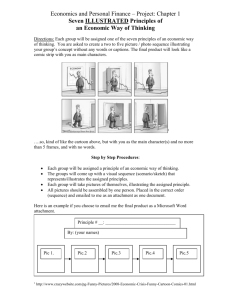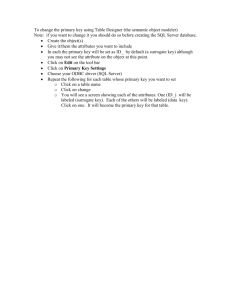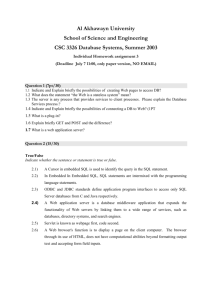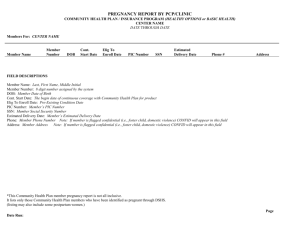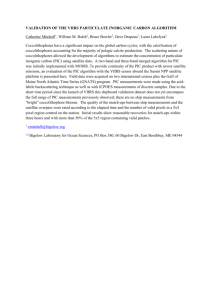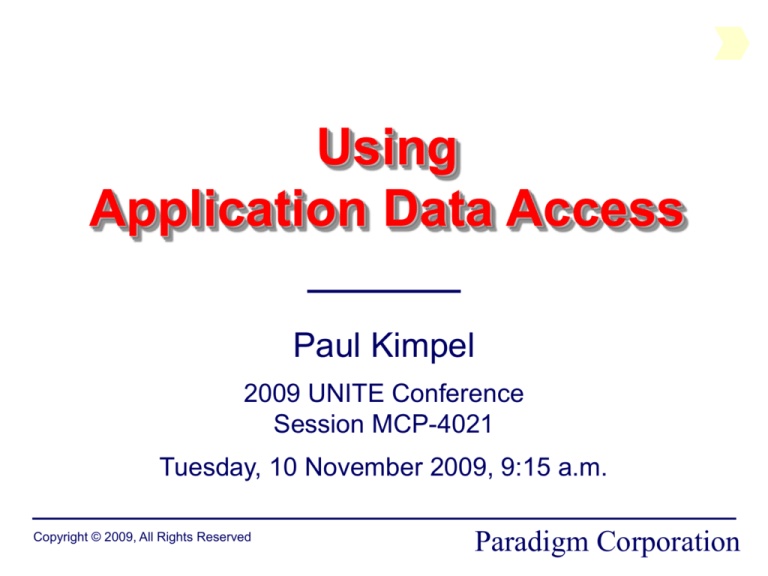
Using
Application Data Access
Paul Kimpel
2009 UNITE Conference
Session MCP-4021
Tuesday, 10 November 2009, 9:15 a.m.
Copyright © 2009, All Rights Reserved
Paradigm Corporation
Presentation Topics
Overview of ODBC and A-D-A
Installing and Configuring A-D-A
Programming for A-D-A
Connecting to the Windows proxy server
Connecting to the data source
Preparation and basic execution of SQL statements
Basic retrieval of results
Closing and deallocating API objects
Advanced API Topics
Binding parameters
Binding result set columns
Overview of schema discovery
MCP-4021
2
Overview of
ODBC and A-D-A
What is ODBC?
Open Database Connectivity
A standard API for accessing data sources
Developed by Microsoft in early 1990s
Based on the SQL Call Level Interface (CLI) from
SQL Access Group and X/Open (now The Open Group)
Independent of language, database, or O/S
Components of ODBC
Clients (user applications)
ODBC Driver Manager (supplied by Microsoft)
ODBC Drivers (each specific to a data source)
ODBC-enabled data sources
– These are often, but not necessarily, databases
MCP-4021
4
Architecture of ODBC
Client System
App
App
App
ODBC Driver Manager
Driver
Driver
DB
DB
MCP-4021
5
ODBC Implies SQL
ODBC provides standard methods for
Submitting SQL statements to a data source
– Supports query, update, stored-procedure calls
Receiving query results (a result set)
Controlling transactions (commit, rollback)
Discovering data source schema
Determining capabilities of the ODBC driver
ODBC defines a standard SQL subset
Drivers translate the standard subset to the dialect of
their data source
Most drivers also accept their native SQL dialect
See Microsoft ODBC specifications for subset syntax
MCP-4021
6
What is Application Data Access?
MCP-resident API for ODBC data sources
Originally known as HDBC (Trans-IT ODBC product)
Based on ODBC 2.0 API for the C language
Extended to support Algol and COBOL-74/85 clients
– No Algol or COBOL support for C-style pointers
– No COBOL support for call-back functions
Is not itself an ODBC driver or manager
ODBC drivers are specific to a data source
– Generally produced by the data source vendor
– Generally targeted to a specific hardware & O/S
Everybody writes ODBC drivers for Windows
Nobody writes them for the MCP
Therefore, A-D-A acts as a proxy for a Windows driver
MCP-4021
7
Architecture of A-D-A
MCP System
Windows Proxy System
A-D-A API
App
App
TCP/IP Sockets
Unisys A-D-A Service
App
App
ODBC Driver Manager
Driver
Driver
DB
DB
MCP-4021
8
Requirements for A-D-A
Separately licensed MCP software
Style xx-DLK
Included with metered and development systems
Included with the laptop SDK
Requires a run-time key, e.g., 531-APP-DATAACCESS
Must have a Windows system for the proxy
Must be able to run a service
Must have TCP/IP connectivity from the MCP
Must have Microsoft ODBC Manager installed
Must have necessary drivers for data sources
Data sources themselves can be local or
remote to the Windows proxy
MCP-4021
9
The A-D-A API
ODBC API was derived from SQL Call
Level Interface (CLI) for the C language
Unisys A-D-A extends the C API with
Environmental control (connecting to the Win proxy)
Support for COBOL and Algol programs
Very similar to the DMSQL CLI
Concepts are essentially identical
Most functions have same name and similar arguments
Unisys docs only provide an API summary
Details are in the Microsoft ODBC API reference
http://msdn.microsoft.com/en-us/library/ms710252(VS.85).aspx
MCP-4021 10
Installing and Configuring A-D-A
Installing the Windows Proxy Service
Standard MSI, install from
CD-ROM release media
MCP Installs share
Installation decisions
TCP/IP port number (default is 9876)
Automatic or manual service initiation
Whether to write messages to Windows Application log
Manual Windows service start/stop
Use Services applet in Administrative Tools, or
Use command line:
– net start HDBCServer (HDBCdmn on MCP 12)
– net stop HDBCServer
MCP-4021 12
Configuring the Windows Proxy
Unisys proxy service needs no further setup
ODBC driver configuration
Install the necessary drivers for your data source(s)
Configure data source(s) using ODBC Administrator
Configure each as a "System DSN"
Authentication credentials
Can be established in the DSN configuration
Can be overridden by credentials in connection strings
Test access from the proxy system
It is the client from the data source's perspective
A-D-A just interfaces the proxy to the MCP environment
MCP-4021 13
Installing A-D-A in the MCP
Normally use Simple Install
SYSTEM/DATAACCESS/APPDATAACCESS
SYSTEM/DATAACCESS/APPDATAACCESS/DRIVERI18N
SYSTEM/INSTALLS/APPDATAACCESS/=
SYMBOL/DATAACCESS/APPDATAACCESS/=
EXAMPLE/=
System Libraries
SL APPDATAACCESS
SL APPDATAACCESSI18N
MCP-4021 14
Configuring A-D-A for the MCP
Global configuration file
APPDATAACCESS/CONFIG
Under same usercode and family as the SL-ed library
Must have sequence numbers in 73-80 (e.g., SEQDATA)
See EXAMPLE/APPDATAACCESS/CONFIG
Defines the Windows proxy server(s)
MCP can connect to multiple Windows proxies at once
One app is limited to one proxy server, though
Each server is assigned a name
Config file defines server attributes for that name
MCP apps use that name to connect at run time
MCP-4021 15
A-D-A Global Configuration Example
HDBCSERVER WINBOX (
ADDRESS
= "192.168.16.2", % of the Win proxy
TRANSPORT
= TCPIP,
SERVICEPORT = 9876,
MYCCS
= EBCDIC,
NTCCS
= ASCII,
APPLYCCS
= APPLY_CCSV); % or IGNORE_CCSV
HDBCSERVER BACKUPSRV ( ... );
HDBCSERVER THIRDSERVER ( ... );
Instead of ADDRESS, can also specify:
• HOSTNAME = <BNA hostname>
• DOMAIN = "<TCP/IP domain name>"
MCP-4021 16
Programming for A-D-A
This Stuff is Complex!
SQL interface is very dynamic
Program is bound to the schema only at run time
Unlike DMSII Host Language Interface:
– Compiler cannot know about record/row formats
– Format of SQL results is determined by the query
– References to fields must be made at run time
– You must do the work that DASDL and the compilers
do with DMSII
This is why the ODBC API is so low-level
and complex by comparison to DMSII
Will discuss the API as extended by A-D-A
for COBOL and Algol
MCP-4021 18
A-D-A API Functions
Environment Control
SQLAllocConnect
SQLAllocEnv
SQLAllocStmt
SQLBrowseConnect
SQLDisconnect
SQLDriverConnect
SQLFreeConnect
SQLFreeEnv
SQLFreeStmt
SQLGetConnectOption
SQLGetInfo
SQLGetInfoInt
SQLGetTypeInfo
SQLSetConnectOption
A-D-A Custom
ODBCApplyCCS
ODBCGetCCS
ODBCInit
ODBCSetCCS
Preparation
SQLBindParameter
SQLDescribeParam
SQLGetCursorName
SQLGetStmtOption
SQLNativeSQL
SQLNumParams
SQLPrepare
SQLSetCursorName
SQLSetStmtOption
MCP-4021 19
A-D-A API Functions (continued)
Execution
SQLCancel
SQLExecDirect
SQLExecDirectWithParameters
SQLExecute
SQLExecuteWithParameters
SQLParamData
SQLPutData
SQLTransact
Result Sets
SQLBindCol
SQLColAttributes
SQLDescribeCol
SQLFetch
SQLFetchBoundCol
SQLGetData
SQLMoreResults
SQLNumResultCols
SQLRowCount
MCP-4021 20
A-D-A API Functions (continued)
Miscellaneous
SQLError
SQLMemberOf
Schema Discovery
SQLColumnPrivileges
SQLColumns
SQLForeignKeys
SQLPrimaryKeys
SQLProcedureColumns
SQLProcedures
SQLSpecialColumns
SQLStatistics
SQLTablePrivileges
SQLTables
MCP-4021 21
Linking to the A-D-A Library
Link to the library using
LIBACCESS = BYFUNCTION
FUNCTIONNAME = "APPDATAACCESS."
COBOL has two library-calling methods:
COBOL-74/85 method:
– CALL "ENTRYPOINT OF LIBNAME" USING …
– This method is usually easier to code
COBOL-85 method:
– Define entry points in PROGRAM-LIBRARY section
– CALL ENTRYPOINT USING …
– This method is more work
– But performs more type checking at compile time
MCP-4021 22
API Constants and Error Results
API has many named constants:
*SYMBOL/DATAACCESS/APPDATAACCESS/INCLUDE/=
Include the …/COBOL or …/ALGOL file in your app
API calls return an integer result:
SQL-SUCCESS (0)
SQL-SUCCESS-WITH-INFO (1)
SQL-NO-DATA-FOUND (100)
SQL-ERROR (-1)
SQL-INVALID-HANDLE (-2)
In COBOL, define the result value as
77 W-RESULT
PIC S9(11) BINARY.
MCP-4021 23
Reporting Error Results
SQLError message generator routine
Pass in handles for environment, connection, statement
Returns "SQL State" error code, "native" error code, and
a text message
Example:
01 W-SQL-STATE
PIC X(5).
01 W-ERROR-MSG
PIC X(600).
77 W-ERROR-MAX-LEN
PIC S9(11) VALUE 600 BINARY.
77 W-ERROR-LEN
PIC S9(11)
BINARY.
77 W-ERR-RESULT
PIC S9(11)
BINARY.
CALL "SQLERROR OF ADA" USING
W-ENVIR, W-CONN, W-STMT,
W-SQL-STATE, W-RESULT,
W-ERROR-MSG, W-ERROR-MAX-LEN, W-ERROR-LEN
GIVING W-ERR-RESULT.
MCP-4021 24
Steps to Communicate with A-D-A
1. Connect to the Windows proxy server
2. Connect to (or open) the data source
3. Prepare a SQL statement
4. Bind parameter values (if any)
5. Execute the SQL statement
6. Process the result set (if any)
7. Repeat steps 3-6 as necessary
8. Close connection and deallocate objects
MCP-4021 25
Connecting to the Proxy Server
and Data Source
Connecting to the Windows Proxy
ODBCInit initializes the proxy service
A-D-A specific – not part of the ODBC API
Specifies a server name in global configuration file
Caching permits buffering multiple result rows at a time
– CACHE-ON
– CACHE-OFF (required for SQLGetData calls)
Example:
01 W-SVR-NAME
77 W-NAME-LEN
77 W-RESULT
PIC X(8)
PIC 9(4)
PIC S9(11)
VALUE "WINBOX".
VALUE 6 BINARY.
BINARY.
CALL "ODBCINIT OF ADA" USING
W-SERVER-NAME, W-NAME-LEN, CACHE-ON
GIVING W-RESULT.
MCP-4021 27
Connecting to the Data Source
Steps:
Allocate an environment object for the API
Allocate a connection object for the environment
Open the connection to a data source
Allocating an Environment object
Initializes the ODBC API and allocates memory
Returns a "handle" for use in subsequent calls
Handles are opaque integer values – just store them
Example:
77 W-ENVIR
PIC S9(11)
CALL "SQLALLOCENV OF ADA" USING
W-ENVIR GIVING W-RESULT.
BINARY.
MCP-4021 28
Allocating a Connection Object
Purpose
Allocates memory for a connection to a data source
Requires the environment object handle
Returns a connection handle for use in other calls
Can override the global caching option
Third parameter: CACHE-ON or CACHE-OFF
CACHE-IGNORE defaults to the global setting from
ODBCInit
Example:
77 W-CONN
PIC S9(11)
CALL "SQLALLOCCONNECT OF ADA" USING
W-ENVIR, W-CONN, CACHE-IGNORE
GIVING W-RESULT.
BINARY.
MCP-4021 29
Opening the Connection
Passes a connection string to the driver
Requires the connection handle
Format of string varies by driver, but at a minimum:
"<data source name>"
Can also include user credentials:
"DSN=…; UID=<user>; PWD=<password>"
Driver returns an expanded connection
string showing all options applied
Input connection string requires a length value
Output connection string requires
– A maximum length value (it's declared length)
– An integer parameter to receive the actual number of
characters stored by the driver
MCP-4021 30
Connection Opening Example
77
01
77
77
01
W-CS-IN-LEN
W-CONN-STR
W-CS-OUT-SIZE
W-CS-OUT-MAX
W-CONN-STR-OUT
PIC
PIC
PIC
PIC
PIC
9(4)
VALUE 4
X(80)
VALUE
9(4)
9(4)
VALUE 600
X(600).
BINARY.
"HQDB".
BINARY.
BINARY.
CALL "SQLDRIVERCONNECT OF ADA" USING
W-CONN, W-CONN-STR, W-CS-IN-LEN,
W-CONN-STR-OUT, W-CS-OUT-MAX, W-CS-OUT-SIZE
GIVING W-RESULT.
Returns W-CS-OUT-SIZE=228 and the following in W-CONN-STR-OUT:
DSN=HQDB; Description=HQDB Sample;UID=;
Trusted_Connection=Yes; APP=Application Data Access
Server for Unisys ClearPath HMP Systems; WSID=DIGMD83A;
DATABASE=HQDB;: access-mode=READ-ONLY, isolation=READUNCOMMITTED, commit=AUTO
MCP-4021 31
Additional Connection Functions
Iterative connection attribute discovery
SQLBrowseConnect
Driver and data source information
SQLGetInfo
SQLGetInfoInt
SQLGetTypeInfo
Connection options
SQLGetConnectOption, SQLSetConnectOption
Significant attributes (see constants in include file)
–
–
–
–
SQL-ACCESS-MODE (read-only, read-write)
SQL-AUTOCOMMIT (manual, automatic)
SQL-CURRENT-QUALIFIER (sets current database context)
SQL-TXN-ISOLATION (read-committed, serializable, etc.)
MCP-4021 32
Preparation and Basic
Execution of SQL Statements
Preparing and Executing Statements
Steps:
Allocate a statement object for the connection
Construct the SQL text for the statement object
Optionally, prepare (pre-compile) the statement
Optionally, bind parameter values to the statement
Optionally, bind output columns for the statement
Execute the statement
Alternatives to consider:
Preparation or direct execution of the statement
Bind parameter values or embed them in the SQL text
Bind output columns to a buffer or fetch individual
columns from the result set
MCP-4021 34
Preparation vs. Direct Execution
SQL queries can be complex
Requires parsing, conversion, optimization, and
preparation of an execution plan by the driver
This can take considerable time
Direct execution is appropriate for singleuse or infrequently-used statements
Parsing, etc. is done as part of execution
Prepared statement is discarded after execution
Preparation is best for repeated queries
Prepared statement can be efficiently re-executed
Different parameter values can be used each time
Persists until the statement object is deallocated
MCP-4021 35
Allocating a Statement Object
Allocates memory for the object
Requires the connection handle
Returns a handle for use in later calls
Can override the connection caching option –
CACHE-ON, CACHE-OFF, or CACHE-IGNORE
Program can have multiple statements active at once
Statement objects can be reused (re-prepared)
Example:
77 W-STMT
PIC S9(11)
CALL "SQLALLOCSTMT OF ADA" USING
W-CONN, W-STMT, CACHE-OFF
GIVING W-RESULT
BINARY.
MCP-4021 36
Directly Executing a Simple Statement
SQLExecDirect
Prepares the statement, but discards it afterwards
C interface supports parameter markers
No parameter markers if called from COBOL or Algol
Example:
77 W-TEXT-LEN
PIC S9(11) VALUE 66 BINARY.
01 W-SQL-TEXT
PIC X(90)
VALUE
"select a, b, c from atable where code='B'
"order by a, c".
CALL "SQLEXECDIRECT OF ADA" USING
W-STMT, W-SQL-TEXT, W-TEXT-LEN
GIVING W-RESULT.
IF W-RESULT NOT = SQL-SUCCESS
. . .
MCP-4021 37
Preparing a Simple Statement
Prepares a string of SQL text for execution
May contain parameter markers
Execute later with
– SQLExecute or
– SQLExecuteWithParameters
Example:
77 W-TEXT-LEN
PIC S9(11) VALUE 66 BINARY.
01 W-SQL-TEXT
PIC X(90)
VALUE
"update atable set a='NONE' where code='B'".
CALL "SQLPREPARE OF ADA" USING
W-STMT, W-SQL-TEXT, W-TEXT-LEN
GIVING W-RESULT.
IF W-RESULT NOT = SQL-SUCCESS
. . .
MCP-4021 38
Executing a Prepared Statement
SQLExecute
SQL text must have been prepared previously in the
statement object
For C – parameters can be bound before call
For COBOL and Algol – no parameters
Generates a result set if it's a query, otherwise a count
Example:
CALL "SQLEXECUTE OF ADA" USING
W-STMT
GIVING W-RESULT.
IF W-RESULT NOT = SQL-SUCCESS
. . .
MCP-4021 39
Basic Retrieval of
SQL Statement Results
Two Classes of Statement Results
Query statements (SELECT)
Return a (possibly empty) result set
Rows and columns, retrieved a row at a time
Non-query statements (INSERT/UPDATE/DELETE)
Return a just a row count
Retrieve with SQLRowCount call
Row count example:
77 W-ROW-COUNT
PIC S9(11)
CALL "SQLROWCOUNT OF ADA" USING
W-STMT, W-ROW-COUNT
GIVING W-RESULT.
USAGE BINARY.
MCP-4021 41
Bound vs. Fetched Result Columns
SQL queries return a result set
Consists of rows and columns – a table
Columns are determined by the select list ("projection")
Unlike DMSII FINDs, column names and types are
dynamic – not known to the compiler at compile time
Result set is accessed one row at a time
Two methods for accessing the columns:
One column at a time
All columns for a row at once
– Columns are "bound" to fields in a buffer
– One row fetch call stores all columns in the buffer
Can mix both methods with the same query
MCP-4021 42
Retrieving Result Set Data
Column-at-a-time
Call SQLFetch to advance to next row
Call SQLGetData for each column of the row
Conversion takes place for that column value
Row-at-a-time
Usually more efficient for multi-row result sets
Bind output columns in advance to offsets in a buffer
Call SQLFetchBoundCol
– Advances to next row
– Transfers all bound columns to the buffer
– Conversion takes place for each column
Can mix SQLFetchBoundCol with SQLGetData calls
MCP-4021 43
Data Type Conversion
ODBC standard defines a set of SQL types
A-D-A provides conversion between SQL
types and COBOL/Algol types
Used for
Single-column fetching from result sets
Bound-column fetching from result sets
Parameter binding
Data types are assigned numeric codes
Defined in the A-D-A include files
Used in API routines to indicate type of conversion
desired
MCP-4021 44
A-D-A Data Type Constants
Basic SQL Data Types
SQL-CHAR
SQL-NUMERIC
SQL-DECIMAL
SQL-INTEGER
SQL-SMALLINT
SQL-FLOAT
SQL-REAL
SQL-DOUBLE
SQL-VARCHAR
(1)
(2)
(3)
(4)
(5)
(6)
(7)
(8)
(12)
A-D-A COBOL/Algol Types
SQL-COBOL-CHARACTER
SQL-COBOL-COMP
SQL-COBOL-BINARY
SQL-COBOL-REAL
SQL-COBOL-DOUBLE
(100)
(101)
(102)
(103)
(104)
MCP-4021 45
A-D-A Data Type Conversions
COBOL Data Type (USAGE)
SQL Type
CHAR
COMP
BINARY
Char
X
VarChar
X
Decimal
X
X
Numeric
X
X
Smallint
X
X
X
Integer
X
X
X
REAL
Real
X
Double
X
DOUBLE
X
From A-D-A User's Guide, Appendix B
MCP-4021 46
Fetching a Row for Column Retrieval
A successful execution positions the result
set before the first row
Must call fetch function to move to each row in turn
Returns SQL-NO-DATA-FOUND (100) at end
Example:
CALL "SQLFETCH OF ADA" USING
W-STMT
GIVING W-RESULT.
IF W-RESULT = SQL-SUCCESS
. . . (have a row to process)
ELSE IF W-RESULT = SQL-NO-DATA-FOUND
. . . (no next row available)
ELSE
. . . (some error condition)
MCP-4021 47
Fetching a Single Column
Must specify how SQL value is converted
Driver knows type of result set column
Need specify only type/precision/scale of returned value
Pass a buffer to SQLGetData for the value
Also pass
1-relative index to column of result set
Type conversion specifications
Offset into buffer where column value will be placed
Max length of space for the value
– For character data, should be max length+1
– Allows for C-string ending NUL (which isn't stored)
Integer variable to receive actual length of value
MCP-4021 48
Result Set Column Indexes
select a, b, c from tbl where d='A' order by a, b
Result
Set
Row
Col #1 : a
Col #2 : b
Col #3 : c
#1
123
abc
45.6
#2
456
defg
5.33
#3
789
hijkl
6.0
#4
1023
mnop
953.2
#5
4567
qrstuwv
0.22
#6
8901
wxyz
74.1
MCP-4021 49
SQLGetData Function
CALL "SQLGETDATA OF ADA" USING
W-STMT,
In: 1-relative column index
W-COL-INDEX,
W-COBOL-TYPE,
In: Convert-to type
W-COBOL-PRECISION,
In: Only used with SQL-COBOL-COMP
W-COBOL-SCALE,
Out: 01-record to hold value
W-VALUE-DATA,
In: 0-relative offset into record
W-VALUE-OFFSET,
W-VALUE-MAX-LEN,
In: Max size of field in buffer
W-VALUE-LENGTH
Out: actual value length or SQL-NULL-DATA
GIVING W-RESULT.
Notes: All params except W-VALUE-DATA are integers – PIC S9(11) BINARY
Caching must be disabled when using SQLGetData
MCP-4021 50
SQLGetData Example
77
77
77
77
77
77
01
W-COL-INDEX
W-VALUE-OFFSET
W-VALUE-MAX-LEN
W-COBOL-PRECISION
W-COBOL-SCALE
W-VALUE-LENGTH
W-VALUE-DATA.
05 FILLER
05 W-VALUE-COMP
05 FILLER
PIC
PIC
PIC
PIC
PIC
PIC
S9(11)
S9(11)
S9(11)
S9(11)
S9(4)
S9(11)
VALUE 2 BINARY.
BINARY.
BINARY.
VALUE 10 BINARY.
VALUE 4 BINARY.
BINARY.
PIC X(15).
PIC S9(6)V9(4)
PIC X(30).
COMP.
COMPUTE W-VALUE-OFFSET = OFFSET (W-VALUE-COMP)
COMPUTE W-VALUE-MAX-LEN = FUNCTION LENGTH-AN (W-VALUE-COMP)
CALL "SQLGETDATA OF ADA" USING
W-STMT, W-COL-INDEX,
SQL-COBOL-COMP, W-COBOL-PRECISION, W-COBOL-SCALE,
W-VALUE-DATA, W-VALUE-OFFSET, W-VALUE-MAX-LEN,
W-VALUE-LENGTH
GIVING W-RESULT.
MCP-4021 51
Closing and Deallocating
A-D-A Objects
Deallocating Objects
A-D-A is a C-based API
Like everything else when programming C
ODBC object memory allocation is manual
Memory deallocation is also manual
Memory for A-D-A objects is owned by the API, not your
program
You must carefully close and deallocate all
previously-allocated objects
Failing to do so can result in memory leaks
MCP-4021 53
Deallocating Statement Objects
SQLFreeStmt routine
Closes cursor and optionally frees resources
Close options:
–
–
–
–
SQL-CLOSE
SQL-RESET-PARAMS
SQL-UNBIND
SQL-DROP
– Closes a result set (closes cursor)
– Unbinds parameters
– Unbinds bound output columns
– Closes and deallocates everything
Example:
CALL "SQLFREESTMT OF ADA" USING
W-STMT, SQL-DROP GIVING W-RESULT.
MCP-4021 54
Closing and Deallocating Connections
Closing the driver connection
CALL "SQLDISCONNECT OF ADA" USING
W-CONN GIVING W-RESULT.
Deallocating the connection object
CALL "SQLFREECONNECT OF ADA" USING
W-CONN GIVING W-RESULT.
Deallocating the environment object
CALL "SQLFREEENV OF ADA" USING
W-ENVIR GIVING W-RESULT.
MCP-4021 55
Advanced API Topics
Binding Parameters
Binding Result Columns
Schema Discovery
Binding Parameters and
Additional Preparation/Execution
Bound vs. Embedded Parameters
Most SQL statements require data values
Values can be embedded in the SQL text:
select a, b, c from atable where id=12345 and code='A'
Alternatively, can use parameter markers:
select a, b, c from atable where id=? and code=?
Data values must be "bound" to all markers
before execution
param #1
param #2
Typically used with prepared statements
New values can be supplied before each re-execution
Also avoids problems with embedded quotes and
attempts at script injection
MCP-4021 58
Binding Parameters
When parameter markers are used in SQL:
Actual values must be "bound" to each marker
Standard ODBC API binding
– Uses C-style pointers to bind values to markers
– Won't work for Algol and COBOL
A-D-A alternative to pointer-based binding
Store parameter values in a buffer
– 01-record area for COBOL
– EBCDIC ARRAY for Algol
Bind values using 0-relative offsets into the buffer
All parameters for a statement must use same buffer
Different execute routine must be called to pass buffer
MCP-4021 59
SQLBindParameter Function
Binds a value to a parameter marker
Markers are numbered from 1
Based on linear position in SQL text
Converts value from a COBOL type to a SQL type
Each parameter has two fields in the buffer
Value – the COBOL representation of the value
"Descriptor" word – defines the value length (or NULL)
Fields are referenced as 0-relative offsets into the buffer
Numeric (COMP) fields have extra specs
Precision – total number of digits, not counting sign
Scale – number of fractional digits
Ignored for non-COMP types
MCP-4021 60
Parameter Binding in a Buffer
select a, b, c from atable where id = ? and code = ?
Desc#1
Value#1
Desc#2
Value#2
Offsets to descriptor words and values
MCP-4021 61
SQLBindParameter (continued)
CALL "SQLBINDPARAMETER OF ADA" USING
W-STMT,
W-PARAM-INDEX,
W-COBOL-TYPE,
Defines COBOL/Algol data type
W-COBOL-PRECISION,
W-COBOL-SCALE,
W-SQL-TYPE,
Defines SQL data type
W-SQL-PRECISION,
W-SQL-SCALE,
W-VALUE-OFFSET,
0-relative buffer offsets
W-DESCRIPTOR-OFFSET,
Use SQL-PARAM-INPUT
W-PARAM-TYPE,
Max length of value field
W-VALUE-MAX
GIVING W-RESULT.
Note: all arguments are integers – PIC S9(11) BINARY
MCP-4021 62
SQLBindParameter Example
77
77
77
77
01
W-PARAM-INDEX
W-VALUE-OFFSET
W-VALUE-MAX-LEN
W-DESC-OFFSET
W-PARAM-DATA.
05 W-COMP-DESC
05 W-COMP-VALUE
05 W-CHAR-DESC
05 W-CHAR-VALUE
PIC
PIC
PIC
PIC
S9(11)
S9(11)
S9(11)
S9(11)
PIC
PIC
PIC
PIC
S9(11)
S9(6)V9(3)
S9(11)
X(30).
VALUE 1 BINARY.
BINARY.
BINARY.
BINARY.
BINARY.
COMP.
BINARY.
COMPUTE W-VALUE-OFFSET = OFFSET (W-CHAR-VALUE)
COMPUTE W-VALUE-MAX-LEN = FUNCTION LENGTH-AN (W-CHAR-VALUE)
COMPUTE W-DESC-OFFSET = OFFSET (W-CHAR-DESC)
MOVE W-VALUE-MAX-LEN TO W-CHAR-DESC *> actual value length
CALL "SQLBINDPARAMETER OF ADA" USING
W-STMT, W-PARAM-INDEX,
SQL-COBOL-CHAR, SQL-NULL-DATA, SQL-NULL-DATA,
SQL-CHAR, SQL-NULL-DATA, SQL-NULL-DATA,
W-VALUE-OFFSET , W-DESC-OFFSET,
SQL-PARAM-INPUT, W-VALUE-MAX-LEN GIVING W-RESULT.
MCP-4021 63
Executing with Parameters
Bind parameters to a statement object
By ordinal number of the parameter marker (1, 2, 3, …)
Can be done before or after statement preparation
All parameters must be in the same buffer
Fill parameter values into the buffer
Place actual value at its offset
Must be formatted per COBOL type, precision, & scale
Place "descriptor" value at its offset
– 6-byte binary word (i.e., COBOL USAGE BINARY)
– For a NULL value, store SQL-NULL-DATA (-1)
– For character data, store binary length of data
– For other COBOL types, value is ignored (unless it
specifies SQL-NULL-DATA)
MCP-4021 64
Executing with Parameters (con't)
Call the execute function
SQLExecuteWithParameters
SQLExecDirectWithParameters
Pass the parameter buffer to the function
To re-execute a prepared statement:
Simply change values in buffer and execute again
No rebinding necessary
Parameters can be re-bound at any time
Only necessary to change offset/type/precision/scale
Often required if SQL text of statement is changed
MCP-4021 65
Parameter Execute Calls
77 W-TEXT-LEN
01 W-SQL-TEXT
01 W-PARAM-DATA
PIC S9(11)
PIC X(90)
PIC X(60).
VALUE 66 BINARY.
VALUE "<sql text>".
CALL "SQLEXECDIRECTWITHPARAMETERS OF ADA" USING
W-STMT, W-PARAM-DATA, W-SQL-TEXT, W-TEXT-LEN
GIVING W-RESULT.
IF W-RESULT NOT = SQL-SUCCESS
. . .
CALL "SQLPREPARE OF ADA" USING
W-STMT, W-SQL-TEXT, W-TEXT-LEN GIVING W-RESULT
. . .
CALL "SQLEXECUTEWITHPARAMETERS OF ADA" USING
W-STMT, W-PARAM-DATA
GIVING W-RESULT.
IF W-RESULT NOT = SQL-SUCCESS
. . .
MCP-4021 66
Additional Prepare Functions
Parameter metadata available from prepare
SQLNumParams
SQLDescribeParam
Miscellaneous
SQLNativeSQL
SQLGetCursorName, SQLSetCursorName
Statement options
SQLGetStmtOption, SQLSetStmtOption
Significant attributes (see constants in include file)
–
–
–
–
SQL-CONCURRENCY
SQL-CURSOR-TYPE
SQL-MAX-ROWS
SQL-QUERY-TIMEOUT
MCP-4021 67
Additional Execute Functions
Cancel an in-process statement
SQLCancel
Supply data-at-execution
SQLParamData
SQLPutData
Transaction control
SQLTransact
Only effective if connection auto-commit is disabled
Auto-commit is typically enabled by default
Options (see include file):
– SQL-COMMIT
– SQL-ROLLBACK
MCP-4021 68
Binding Result Columns and
Additional Result Set Retrieval
Result Column Binding
Bind result set columns to buffer offsets
Call SQLBindCol for each column
Similar in concept to parameter binding
Similar type conversion as with SQLGetData
Two fields per column – data value and descriptor word
Can be done at any time prior to fetch
Fetch row
Call SQLFetchBoundCol once for each row
Similar to SQLFetch, but uses buffer to receive values
Formats each bound column at its offset in the buffer
Stores actual column length in its descriptor word
Somewhat like what you get from a DMSII FIND
If no next row exists, result = SQL-NO-DATA-FOUND
MCP-4021 70
Column Binding in a Buffer
select a, b, c from atable where id = ? and code = ?
Desc#1
Value#1
Desc#2
Value#2
Offsets to descriptor words and values
MCP-4021 71
SQLBindCol Function
CALL "SQLBINDCOL OF ADA" USING
W-STMT,
In: 1-relative column index
W-COL-INDEX,
W-COBOL-TYPE,
In: Defines COBOL/Algol type
W-COBOL-PRECISION,
W-COBOL-SCALE,
In: 0-relative offset into record area
W-VALUE-OFFSET,
In: maximum length of column data
W-VALUE-MAX-LEN,
W-DESCRIPTOR-OFFSET, In: 0-relative offset to descriptor word
W-BIND-COL-FLAG
In: SQL-BIND-COL or SQL-UNBIND-COL
GIVING W-RESULT.
Notes: All arguments are integers – PIC S9(11) BINARY
Last argument can specify a column is to be unbound from a statement
For character columns, pass max length+1 (to allow for NUL terminator)
MCP-4021 72
SQLBindCol Example
77
77
77
77
01
W-COL-INDEX
W-VALUE-OFFSET
W-VALUE-MAX-LEN
W-W-DESC-OFFSET
W-VALUE-DATA.
05 W-COMP-DESC
05 W-COMP-VALUE
05 FILLER
05 W-CHAR-DESC
05 W-CHAR-VALUE
PIC
PIC
PIC
PIC
S9(11)
S9(11)
S9(11)
S9(11)
PIC
PIC
PIC
PIC
PIC
S9(11)
S9(6)V9(4)
X(7).
S9(11)
X(30).
VALUE 3 BINARY.
BINARY.
BINARY.
BINARY.
BINARY.
COMP.
BINARY.
COMPUTE W-VALUE-OFFSET = OFFSET (W-CHAR-VALUE)
COMPUTE W-VALUE-MAX-LEN = FUNCTION LENGTH-AN (W-CHAR-VALUE)
COMPUTE W-DESC-OFFSET = OFFSET (W-CHAR-DESC)
CALL "SQLBINDCOL OF ADA" USING
W-STMT, W-COL-INDEX,
SQL-COBOL-CHAR, SQL-NULL-DATA, SQL-NULL-DATA,
W-VALUE-OFFSET, W-VALUE-MAX-LEN, W-DESC-OFFSET
SQL-BIND-COL GIVING W-RESULT.
MCP-4021 73
SQLFetchBoundCol Example
CALL "SQLEXECUTE OF ADA" USING
W-STMT GIVING W-RESULT.
PERFORM UNTIL W-RESULT NOT = SQL-SUCCESS
CALL "SQLFETCHBOUNDCOL OF ADA" USING
W-STMT, W-VALUE-DATA GIVING W-RESULT
IF W-RESULT = SQL-SUCCESS
(process results in record area)
END-IF
END-PERFORM
IF W-RESULT NOT = SQL-NO-DATA-FOUND
(deal with error result)
END-IF.
MCP-4021 74
Additional Result Set Functions
Initialize "more results"
SQLMoreResults (non-query statements only)
Retrieve result set metadata
Very useful for writing general-purpose tools
Available after a statement is parsed or executed
SQLNumResultCols
SQLDescribeCol
SQLColAttributes
MCP-4021 75
ODBC Schema Discovery
ODBC Schema Discovery
Driver can return detailed schema metadata
about the data source
Data is returned as a result set
See Microsoft documentation for format
Requires a Statement object as a parameter
Most functions allow filtering by table, column, etc.
MCP-4021 77
Schema Discovery Functions
Table metadata
SQLTables
SQLTablePrivileges
Column metadata
SQLColumns
SQLColumnPrivileges
SQLSpecialColumns
Procedure (invokable
object) metadata
SQLProcedures
SQLProcedureColumns
Data statistics
SQLStatistics
Key/index metadata
SQLPrimaryKeys
SQLForeignKeys
MCP-4021 78
References
MCP Application Data Access User's Guide (4310 5931)
Microsoft ODBC information
http://msdn.microsoft.com/en-us/library/ms714177(VS.85).aspx
This is currently describes ODBC 3.81, but it discusses how it operates
with the ODBC 2.0 API
This presentation
http://www.digm.com/UNITE/2009
Web site includes sample programs
MCP-4021 79
End
Using Application Data Access
2009 UNITE Conference
Session MCP-4021

